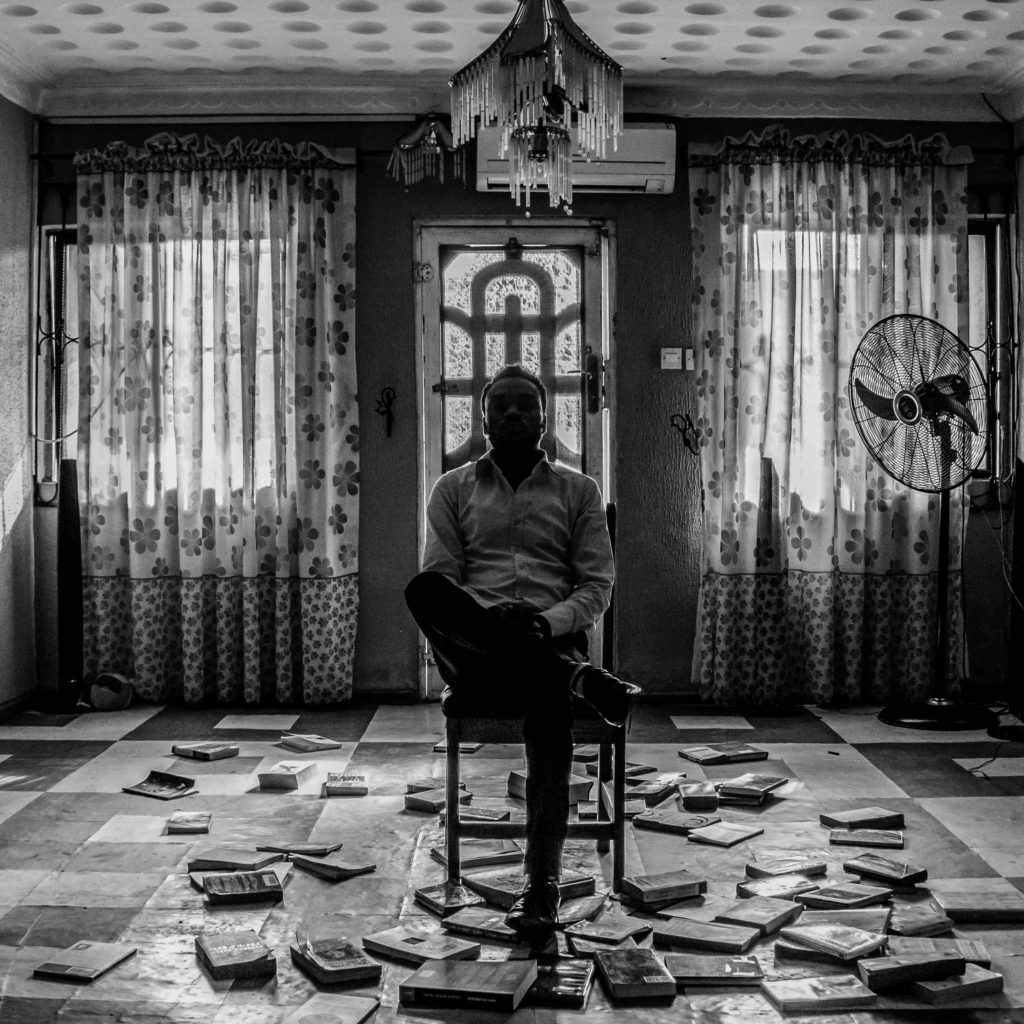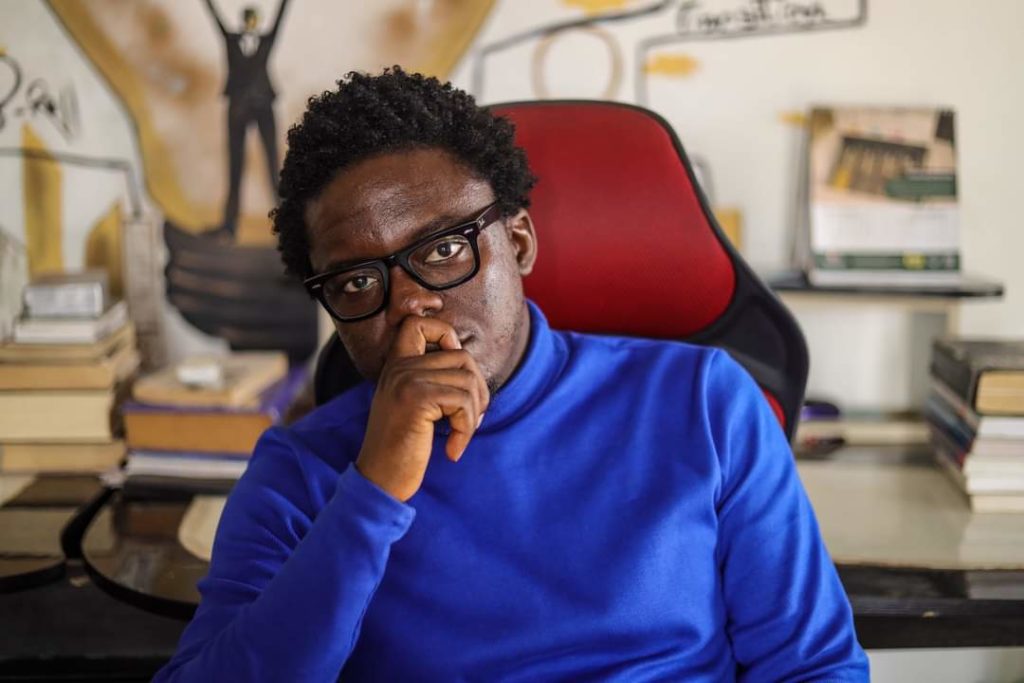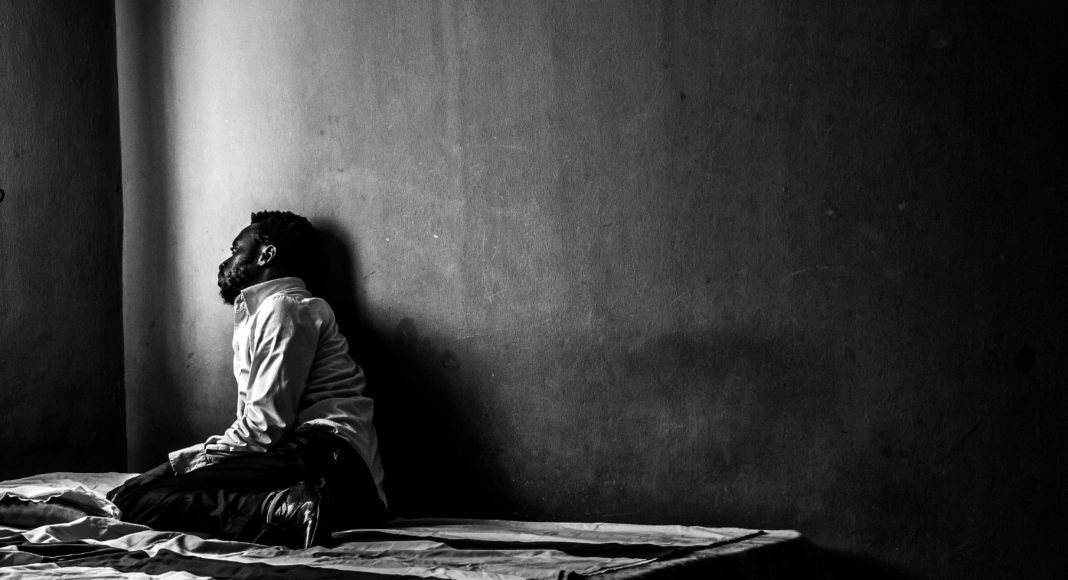By Ope Adetayo
When Tukura John Daniel was a child, he noticed he was energetic in one moment and in the next, he was sad and he craved his own company. When he wanted some time to himself, Daniel, who goes by the nickname Tee Jay, would seek refuge among the rocks behind the house where he lived with his parents in Minna, the capital of Niger.
Tee Jay’s community, including his own parents, did not understand him. Sometimes, he was punished because people found his behavior weird. It did not help him as a child in a Christian home that he was inquisitive and would sometimes challenge the Sunday school teacher on theological teachings.
At one point in 2003, leaders of the church proclaimed he was possessed and his family began numerous rounds at prayer houses for his “deliverance.”
“They did these very despicable, very terrible, horrible things to me, trying to deliver me from demons,” Tee Jay, who is now 31, recalled. One of those deliverance sessions, when he was 13 at a church in the Tunga area of Minna, stood out.
The prayer session at the church that night lasted from 9 to 11 pm. After the prayer session, when Tee Jay’s siblings who came with him had left, the pastor approached him and started asking what cult he belonged to, if he flew, ate or traveled to other countries in his dreams, or if, in his dreams, he saw Ibrahim Badamasi Babaginda, the military dictator from Minna who ruled Nigeria between 1985 and 1993.
After he responded no, the pastor and two other people tied him up and lit candles around him. The three of them forced olive oil down his throat and then left him at the altar for the entirety of the night without food or water.
“That night, I went through the whole gamut of emotions: I was angry, I was enraged, I was confused, I wanted to hurt somebody,” he remembered. The next morning, after a series of questions which were met with stone silence, the pastor decided Tee Jay had to be marked for Jesus. He heated a round-headed metal on a kerosenestove and pressed it on Tee Jay’s wrists, back and thigh.
Tee Jay is still living through the trauma of that night. “In 2020, during the coronavirus lockdown, I went back to the church, but I think it no longer exists. I wanted to see the pastor. At first, I wanted to hurt him but now I just want to explain to the pastor that he was wrong about me,” said Tee Jay, who was eventually diagnosed with bipolar disorder.
Priced out of healthcare
Bipolar disorder, formerly known as manic depression, is a mental health condition characterized by extreme mood swings that “include emotional highs (mania or hypomania) and lows (depression),” according to the Mayo Clinic. It is a lifelong condition, but it can be managed by medication and psychotherapy, both of which are prohibitively expensive and out of reach of the average Nigerian.
Tee Jay began therapy in 2018 but was fully diagnosed in 2020, following his initial refusal to have a full test. It cost him 250,000 naira ($660) in a one-off bargain for therapy but therapy can cost between 5,000 ($14) to 50,000 naira ($132) per session. Nigeria’s minimum wage is 30,000 naira ($80).
According to the 2019 National Bureau of Statistics report, 83 million people – an estimated 40 percent of the country’s population – live below the country’s poverty line. These numbers preceded the coronavirus pandemic, which has increased poverty throughout the country. This means that working and middle class people living with mental health conditions in the country are priced out of healthcare.
While Tee Jay who is a filmmaker and a publisher can manage to afford therapy sessions, others like Kiishi Adediwura, a 24-year old former customer service agent with symptoms of mild bipolar disorder in Ibadan and Modupe Grace*, a 34-year old mother of one living in Lagos, battling severe depression with suicidal ideation cannot even afford a diagnosis, let alone sessions with a therapist.

“I am a broke young person living in Nigeria,” Kiishi said when asked why she has not been going for treatment despite noticing a pattern of bipolar disorder. Modupe is also facing a similar problem.
Modupe’s condition began when she lost her job due to Nigeria’s continuously declining economy since 2015, when Muhammed Buhari was elected president. It drove her into depression and she decided to see a therapist even though she was unemployed. It only lasted two sessions and each session cost 30,000 naira ($80).
“The cost for this was originally 45,000 naira ($120) per session and I was supposed to register with the clinic for about 10,000 naira ($26),” she said. The therapist “beat the price down for me because I was unemployed and dealing with a lot. It was still steep for my non-existent budget,” she explained.
“The truth is mental health is not just costly in Nigeria, it is costly everywhere. The same way medical care is very expensive anywhere in the world. The difference in Nigeria is that a lot of the time, there is so much poverty in Nigeria and a lot of people cannot even consider things that we consider basic,” Dr. Obabire Adeyemi, a senior registrar at the department of behavioral sciences, University of Ibadan Teaching Hospital, told Sahelien.com.
“There is really no safety net for people to be able to access medical care without paying out of their pockets. Also, many mental illnesses tend to run a chronic course and people need specialized services, not just medication. They need specialized services from other professionals like psychotherapist, operational therapist, social workers, and others,” Dr. Obabire said.
Lack of mental healthcare infrastructure
While different generations have approached mental healthcare differently, the topic still retains its taboo status. The difference can be linked to the advent of social media for the new generation where mental health myths are debunked and a lot of education about them is ongoing with many NGOs like Mentally Aware Nigeria Initiative (MANI) and She Writes Woman, which provides free virtual therapy, filling the void. However, these initiatives are a drop in the bucket of mental health needs, as evidenced by the high rate of suicide among young Nigerians.
According to the World Health Organization, Nigeria has the 15th-highest age-adjusted suicide rate in the world, and the third-highest age-adjusted suicide rate for females in the world. One prominent reason among many for this is the lack of healthcare structure. Nigeria has just eight psychiatrist hospitals serving its estimated 200 million citizens.
There are 250 psychiatrists in Nigeria and 200 of them are trainees, according to the Association of Psychiatrists of Nigeria. Most of them are in private practice because the vast majority of government hospitals do not have provisions for mental healthcare. Even that low figure may yet dwindle in the future, as eight out of every ten medical professionals are seeking opportunities outside the country, according to a 2017 poll by Nigerian Health Watch.
Dr. Obabire admitted that there is a huge scarcity of these professionals and if there were competition, the rates might go down. Taiwo Adeleye-Davids, a mental health counselor with Mentally Aware Nigeria Initiative (MANI), echoed that assertion. “The same economic law of demand and supply will either crash the price of therapy and make it more accessible for people or increase it,” he said.
The landscape of mental healthcare in Nigeria is barely given recognition in political and social discourse, burdening mentally ill people with the weight of navigating a grey area with little or no help. The first mental health legislation in Nigeria was enacted in 1916 when Nigeria was a British colony and in 1958 it was amended and renamed the Lunacy Act of 1958 which is still in place.
The act gives medical practitioners or any legal authority the power to forcefully detain people living with mental illnesses regarded as “lunatics.” Efforts have been made to repeal this act but they have been abortive. In 2003, a bill was introduced to the National Assembly but it met a legislative sandbag and was withdrawn in 2009. In 2013, another bill was introduced but it is yet to be passed into law.
This is symptomatic of the scant awareness for mental health in Nigeria. The government is yet to fully grasp the magnitude of the crisis.
“You cannot remove mental illness from the cultural context”
Pre-colonial psychiatry varies from one part of the country to another. However, the common denominator was that diagnosis and treatment were rooted in mystic approach with the belief that supernatural elements were involved in mental health crises. Healers perform “religious rites and apply pharmaceutically active substances prepared from plants, minerals and animals.”
Asylums were first opened in Nigeria in the early 1990s, with one in Calabar in 1904 and Lagos in 1907. The British colonial government operated asylums up till the late 1940s when Nigerian soldiers who fought for the British Empire returned from Second World War.
In 1954, one of the asylums fully transitioned into the first neuropsychiatric hospital in Aro, which is now a part of the modern-day Ogun state. The efforts were pioneered by Thomas Adeoye Lambo, the first trained Nigerian psychiatrist, with “the aim of making use of traditional socio-cultural resources of the community in the treatment of persons with mental disorders.”
Now, neuropsychiatric hospitals in Nigeria rely heavily on Lambo’s model, which involves “a hybrid of the scientific method brought by colonization and traditional means of treating and assessing [illnesses], because you cannot remove mental illness from the cultural context,” Dr. Obabire told Sahelien.com
Treatment of mental illness is not a tea party. Besides the grueling hours at therapy sessions, anti-psychotic medications may have a number of uncomfortable side effects like restlessness, dizziness, slow brain function, constipation among numerous others which in the meantime might seriously impair the day-to-day functioning of patients.
“I hate them, I hate taking the medicine,” Tee Jay said with a forceful tone, visibly annoyed. “I know people who also do. They lead to weight gain, you are always nauseous, they just turn you into a vegetable,” he continued.
Tee Jay lost everything and left his businesses which he had made profits to the tunes of millions of naira in tatters after experiencing a year-long unbridled mental health crisis between 2016 and 2017.
“Medication does not make their conditions worse but it can feel unpleasant… It is true that the effects of anti-psychotic drugs can be discomforting and affect other parts of the person’s life like work and even family,” Taiwo explained.

“Punishment from God”
Despite the harrowing experiences of mentally ill people, perception of mental health in Nigeria is extremely poor despite the fact that 20-30 percent of the country’s population is believed to suffer from some sort of mental disorder. In a 2020 survey by Africa Polling Institute and EpiAFRIC, 70 percent of Nigerians believe mental health disease is “when someone starts running around naked,” 54 percent believe “possession of evil spirits” is a major cause of mental disorder and 23% are of the opinion that mental disorder is a “punishment from God.”
Modupe said she wakes up every day regretting she did not die in her sleep. While depression eats deep without any treatment, she holds on for a day more. “Every day is a struggle. I feel like I am in slow motion or caught in a bad dream that I want to escape from,” she said.
Socially, her problems are not viewed from the health lens but from a mystic view that majorly attributes her condition to supernatural forces. “It is hard enough for people dealing with mental health issues [because] just a few can understand or relate, as we live in a society that is ignorant when it comes to mental health issues,” Taiwo noted.
What is worse, according to Dr. Obabire, is that the lack of treatment provokes a vicious cycle for a mentally ill person. “The sad truth is that not being able to afford treatment for any medical condition, especially mental disorders, is bad for the individual’s prognosis. The major risk is that this person is likely to experience future recurrence of episodes.”
With the absence of a financially accessible mental healthcare system and living in a stigmatizing society, they are expected to cope and function properly. Some of them find alternative means. Kiishi, for instance, finds succor in the company of friends and travelling.
Still, that does not make up for proper therapy. “What I try to do is to find things that make me happy. I travel, hang out with my friends. I try to be in the company of others or go to events. But they are short term, they are not really effective,” she said.
Modupe, on the other hand, has to take care of a child. She says the responsibility of not passing down her generational trauma motivates her to seek help. In the past year and a half, she has had to resort to subsidized or free internet therapy offers. The experience has been unpleasant, so she stopped.
In one incident, a therapist ended her session mid-way when some affluent clients walked in. The particular session had started forty-five minute late and it still had to end prematurely. “It was proof that you need to have money if you want to be treated right, even when you are solving your mental health issues,” she lamented.
She is alone in her struggle, without help and money, and finding ways to adjust in the society. “I am not coping. Or maybe I should say I am coping badly.”
*Name changed to protect identity

